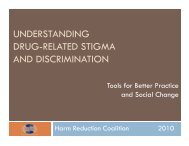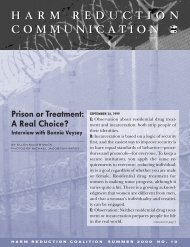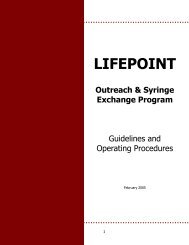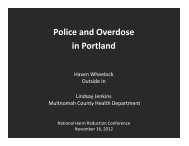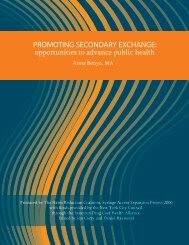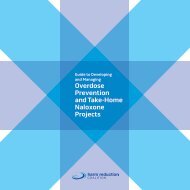9th - Harm Reduction Coalition
9th - Harm Reduction Coalition
9th - Harm Reduction Coalition
You also want an ePaper? Increase the reach of your titles
YUMPU automatically turns print PDFs into web optimized ePapers that Google loves.
<strong>9th</strong><br />
National <strong>Harm</strong> <strong>Reduction</strong> Conference<br />
FROM PUBLIC HEALTH TO SOCIAL JUSTICE<br />
Jacki Gethner (LMT, CADC1) is a renowned international health advocate, activist and educator. In 1987, she launched her practice<br />
Regenerative Therapies and she possesses over 25 years of experience in massage and bodywork. Jacki has a specialty in the<br />
field of HIV/AIDS where she has worked in collaboration with many civic and government agencies, health educators, faith-based<br />
organizations and pharmaceutical companies. Jacki is recognized as a pioneer and seasoned healer in prevention and self-care<br />
of AIDS patients and vulnerable communities through the use of integrative therapies.In 2009 she was the only individual recipient<br />
of the Kaiser Permanente National Diversity Award for her work in HIV/AIDS. She utilized that money to create Women Of<br />
A Certain Age or WOACA. She was awarded the Bank of America’s Neighborhood Excellence Award this last November.Most<br />
recently she was awarded the Multnomah County Public Health Community Leadership Award in April. She has been featured in<br />
Poz Magazine,Huffington Posts’ Greatest Person of the Day, the Lund Report and in other publications. For more information on<br />
Regenerative Therapies and WOACA (a 501c3) please see her site: www.jackigethner.com.<br />
Gibson, Erin, British Columbia Centre for Disease Control, Vancouver, British Columbia<br />
erinkgibson@gmail.com<br />
Increasing Access to Naloxone in British Columbia<br />
Background: Opioid overdose is a public health issue in British Columbia (BC). While BC has the first officially sanctioned<br />
supervised injection site in North America and is the first jurisdiction in Canada to recognize addiction as a chronic illness,<br />
current opioid overdose prevention initiatives are limited to diversion prevention efforts and altering pharmaceutical composition<br />
to prevent “abuse”. BC has not embraced the lifesaving potential of naloxone to the same extent as the US; current<br />
naloxone access in BC is restricted to health care providers in primary and acute care, and ambulance services. Results:<br />
Feedback from six major naloxone programs in the US emphasized the need to address prescribed and illicit opioids. All<br />
stakeholders engaged were highly supportive of a program. Current initiatives being mobilized include: increasing community<br />
capacity to administer naloxone, developing emergency room discharge plans to incorporate naloxone provision for<br />
patients treated for overdose, the development of a provincial Decision Support Tool for nurses and the feasibility of adding<br />
naloxone to the PharmaCare formulary, which provides assistance based on income, to reduce monetary barriers. Challenges<br />
of naloxone distribution in BC include: 1) naloxone must be prescribed by a physician to an individual patient, (there are<br />
no standing orders in BC) 2) the sole naloxone manufacturer in Canada has reduced production; distribution is by allocation<br />
only. Discussion: Comprehensive prevention of morbidity and mortality among people who use drugs includes naloxone and<br />
other wrap-around harm reduction initiatives. Engaging with multiple stakeholders has been key to ensure multi-level support.<br />
This project is timely as one prescription opioid medication is no longer available in BC, and changing to other opioids<br />
may have additional overdose risks.<br />
Erin Gibson has worked in community as an outreach worker for over 12 years. More recently she has taken a new position at the<br />
BC Centre for Disease Control in British Columbia, Canada to develop an Overdose Plan for the province, including increasing access<br />
to naloxone. Furthermore, she is completing her Master in public policy at the University of Victoria.<br />
Goddard, Perilou, Northern Kentucky University, Highland Heights, Kentucky<br />
goddard@nku.edu<br />
Drugs Are Disgusting: Moral Decision Making and Attitudes toward Drug Use and <strong>Harm</strong> <strong>Reduction</strong><br />
Disapproval of harm reduction may stem from a visceral sense of disgust that drug use violates the purity of the body (Mac-<br />
Coun, 1998). Graham and colleagues (2009) have demonstrated that conservatives, in particular, place more value on issues<br />
of purity, authority, and ingroup loyalty when making moral decisions. Thus, harm reduction may challenge conservatives’<br />
ingrained notions of morality. We tested these hypothesized connections in a sample of 263 college students, examining the<br />
correlations among measures of attitudes toward drug/alcohol use and harm reduction with measures of (a) sensitivity to<br />
disgust; (b) relevance of purity, authority, and ingroup loyalty issues to moral judgments; and (c) political conservatism. The<br />
hypotheses were supported. The more participants disapproved of drug/alcohol use and harm reduction, the more easily<br />
46



